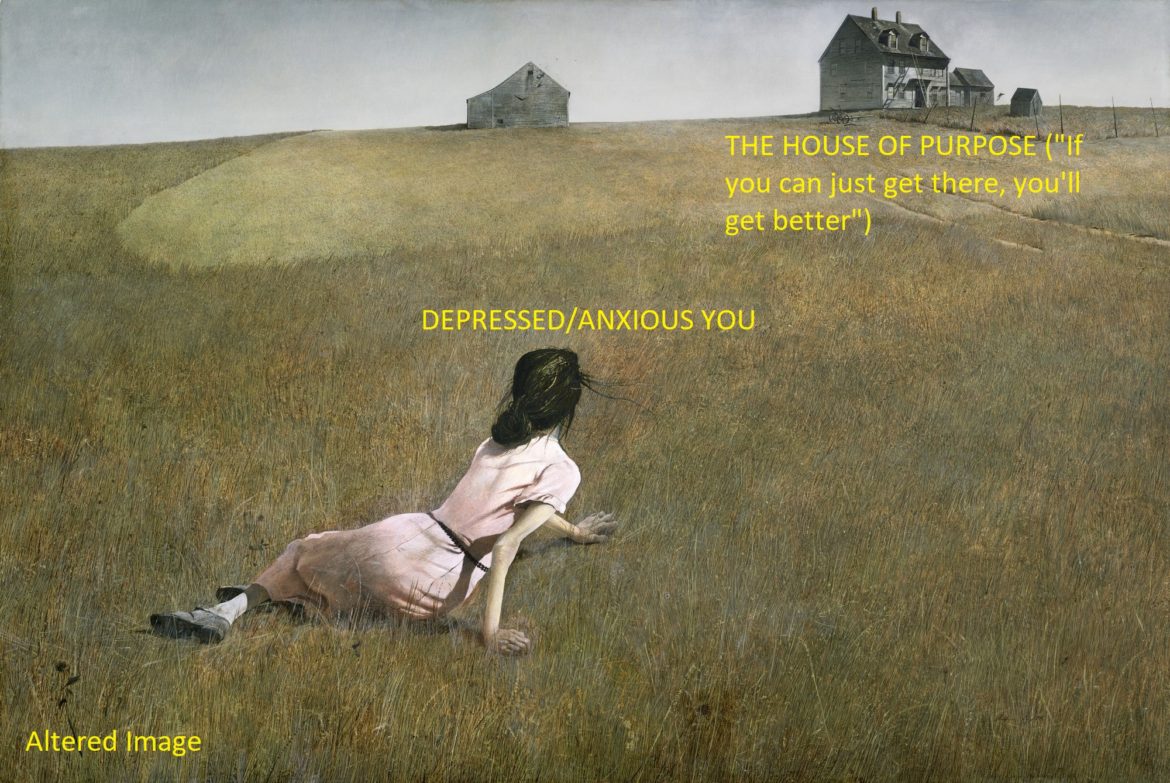If there’s one word Christians have rediscovered the past few decades, it’s “purpose” and it’s both a wonderful and terrifying one to those with depression or anxiety.
In Life of the Beloved, Henri Nouwen gets at the beauty of it, “Everything changes radically from the moment you know yourself as being sent into this world.”
In other words, your birth certificate wasn’t really your beginning, and the earth not your end.
Grasp that distinction and suddenly you’ll feel almost like an angel — a supernatural assistant who exists to serve God and help humankind.
It’s a life-changing perspective, it’s true, and if you’re one of those people who likes to hang up Christian quotes in your guest bathroom toilet (I’ve never quite understood that one), it’s not a bad choice.
Nouwen, of course, is getting at the notion of finding your “calling,” which Frederick Buechner once described as “the place where your deep gladness and the world’s deep hunger meet.”
But here’s the problem some of us face — what if you can’t pursue your calling, because you have no deep gladness, and you can’t step into the world where all the hunger is because you feel, as William Cowper wrote, “buried above ground?”
Even worse, what if you’re flailing and withering, while pursuing your purpose?
We know why we’re on earth and what God wants us to do, but we’re so depressed or crippled with anxiety, that we can’t do it anymore.
In fact, pursuing our purpose is breaking us and those around us.
I’ve talked to plenty in Christian ministry who’ve been so crippled by anxiety and depression, that they’ve prayed for death.
At that point, their purpose wasn’t just unreachable, it was reaching down to choke.
Then, along comes some cheery Christian, telling them to find their purpose and lo and behold, their depression will lift.
For some, yes!
There’s literature suggesting that purpose can be powerful in helping you manage or even treat your depression. Sometimes, it’s even helped me.
But many times, you and I were actually pursuing our purpose when the monster hit, and purpose might have put up a fight for a few seconds, but not really.
So if you’re struggling with depression and trying to figure out how “purpose” fits into all this, here are two thoughts.
First, if you’re going to think about “purpose,” scale it back to the most elemental one of all: Living.
If you were drowning at sea, I hope you wouldn’t let some Church Elder badger you into finding a grander purpose than simply surviving.
“Hey, drowning man. Let’s talk about your purpose. You ever thought about overseas missions?”
“Yes, but I can’t talk about overseas missions right now, because I’m actually in the sea, and about to be under it. Please help.”
“Sure, I affirm your feelings. But the way I’m going to help you is by showing you this PowerPoint about overseas missions. It’s going to give you purpose. You have Zoom? You do have Zoom, right? It’s free. “
“Again. I can’t talk about overseas missions when…” now it’s too hard to finish sentences.
“Is your Zoom bad? You do have Zoom, right? It’s free.”
Your only conceivable and meaningful purpose, at that point, should be finding a log to keep you from drowning. Any purpose beyond that is a ridiculous and dangerous one.
If you have depression or anxiety, your purpose is finding that log and that is treatment for your mental health.
Be careful about listening to Christians who tell you that if you just get outside of yourself for a second, if you just find a purpose, you’ll be cured.
Most of us had a calling when anxiety hit, and then the calling started screaming profanities and felled us.
So if you’re depressed, go straight-away to your local doctor and, if he or she recommends, a therapist.
But in the meantime, while we try to get better, is there anything we can do? I mean, anything?
Has the Lord left us entirely crippled when we’re crippled with depression?
It can seem so.
During the darkest period of my life, when I was alone because I wanted to be, even though I didn’t want to be, when I isolated myself the way depressed people do, even though I didn’t want to be isolated, when I felt guilty for doing nothing, but only could do nothing.
When all of that was that, I realized I could still do something. I could pray for others. (Sometimes).
And if God is to be believed, then there was nothing on earth or heaven more productive for his kingdom.
Prayer can be your purpose, when your disease unpurposes you for anything else.
Pray for the ones you’d normally help, if your disease didn’t get in the way.
The Lord will listen and he will send those who can help.
Whether heavenly angels or the earthly ones. He has plenty of hands and feet, but I doubt he has many who truly pray.
That’s because it never seems very productive, praying, and we don’t do it much.
But in the Lord’s economy, the things that don’t seem productive are always the most.
We tend to exaggerate the spiritual productivity of Christian leaders and diminish those of Christians who are barely managing to stay alive and, as they’re “buried above ground,” somehow lift a true, sincere prayer to heaven.
So if you’re alone, right now, and feel useless, spend five minutes (even two) praying to the Lord for someone like yourself.
Some unknown soldier, in a Kansas City or Melbourne or Kiev, who is also on the ground, far from life or death, unshowered, grubby, and turning down life because it means nothing to them.
I don’t particularly like the word “blessing” because it has become such a maddening reflection of an American evangelical subculture that is a nauseating production. From sea-to-shining-sea. With its terrible “Christian” movies and music and all the empty, vain ways we try to tell the world we’re not of it. The politics, the production, the way American Christendom has replaced Christianity, the life of weird culture, and not the cross. The way we bow to the American Bald Eagle holding a Bible in its talons and not the Savior on the cross, holding our sins on his shoulders.
In this world, “blessing” has become a linguistic distinctive of all that and little more.
So I don’t like using the word “blessing” on the blog, but I’m going to make an exception, because later on in his book, Nouwen writes of blessing in a way that hits at the heart of what the word is, and what you and I can still do, even in our disease.
Nouwen writes:
“The blessed one always blesses. And people want to be blessed!
This is so apparent wherever you go. No one is brought to life through curses, gossip, accusations, or blaming.
There is so much of that taking place around us all the time.
And it calls forth only darkness, destruction, and death. And the ‘blessed ones’, we can walk through this world and offer blessings.
It doesn’t require much effort.”
If the “deep gladness” that Buechner writes of isn’t in your world right now, prayer can be your calling.
And once you’ve said “amen,” if you can possibly get up, please go to your doctor, so that one day, even though it seems impossible now, you can find your deep gladness to meet the world’s deep hunger again.

Christian Heinze is editor of The Weary Christian.
[Painting: Cristina’s World, Wyeth – altered image. of course]

